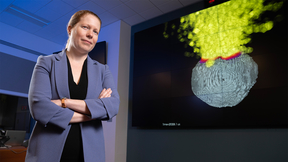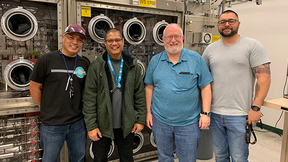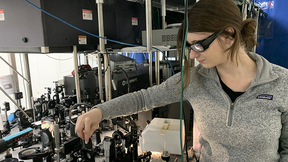Livermore scientists part of organization that will receive Nobel Peace Prize
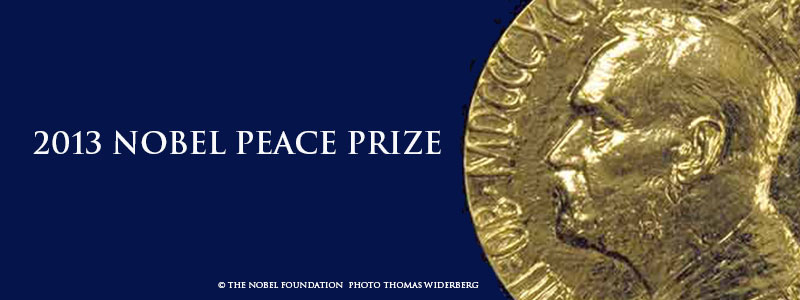 (Download Image)
Representatives of the Organization for the Prohibition of Chemical Weapons (OPCW) will step forward to receive the 2013 Nobel Peace Prize. They will do so in large measure because of the contributions from 21 scientific laboratories around the world, including two in the United States. Lawrence Livermore National Laboratory is one of them.
(Download Image)
Representatives of the Organization for the Prohibition of Chemical Weapons (OPCW) will step forward to receive the 2013 Nobel Peace Prize. They will do so in large measure because of the contributions from 21 scientific laboratories around the world, including two in the United States. Lawrence Livermore National Laboratory is one of them.
Lawrence Livermore National Laboratory (LLNL) is one of the two U.S. laboratories; it has been a certified OPCW laboratory since 2003. The U.S. Army's Edgewood Chemical Biological Center, located at the Aberdeen Proving Ground in Maryland, is the other lab.
In October, the Norwegian Nobel Committee announced that this year's peace prize would be awarded to the OPCW for its extensive efforts to eliminate chemical weapons. The award will be presented Tuesday afternoon in Oslo, Norway.
"I think this award is very special and satisfying to our entire team at LLNL," said Armando Alcaraz, a chemist who has led LLNL's OPCW work for the past 13 years. "We would like to think that in a small way we have helped contribute to preventing the proliferation of chemical weapons in the world."
"Our OPCW work, along with the efforts of the other 20 laboratories, provides an important international security capability by helping to verify and ensure compliance with the Chemical Weapons Convention," said Brad Hart, head of the Laboratory's Forensic Science Center, which oversees LLNL's OPCW efforts. "For an international organization like this to succeed, it is necessary to have cutting-edge technology and expertise that provide confidence in the verification process."
Agreed to by 190 nations, the Chemical Weapons Convention came into force in 1997 and bans the production, stockpiling and use of such weapons. The convention is implemented through the OPCW, a multinational organization headquartered in The Hague, Netherlands.
The Livermore Forensic Science Center is accredited to accept samples and analyze them for the possible presence of chemical weapons agents under the Chemical Weapons Convention.
To maintain its accreditation, LLNL, like the other scientific laboratories, must undergo challenging chemical sample proficiency tests and maintain a three-year rolling average of at least two "A" grades and one "B."
The Forensic Science Center's staff of 15 analytical chemists and organic synthetic chemists spends long hours during a period of 15 consecutive days each year, typically in the fall, seeking to unravel the mix of different chemicals in the proficiency test samples.
The chemical mixtures, which are prepared and graded by separate peer laboratories, may contain organic chemicals or soil, water or decontamination samples. In many proficiency tests, the OPCW labs are given unknown reportable compounds that do not appear in any chemical databases.
"It's challenging, and unknown chemicals can be a part of the proficiency tests," Alcaraz said.
The Lab's Forensic Science Center was selected in 2000 by the State Department to be a U.S. facility to seek OPCW certification. It was picked because of the Laboratory's advanced environmental controls and physical security, as well as its capabilities in detecting and analyzing traces levels of unknown materials.
Other OPCW laboratories are located in a number of nations around the world, including Finland, Sweden, Spain, Singapore, the United Kingdom, Germany, India, Russia, the People's Republic of China, South Korea and France, among others.
"The decision by the Nobel Committee to bestow this year's Peace Prize on the OPCW is a great honor for our organization," said OPCW head Ahmet Uzumcu. "We are a small organization, which for more than 16 years, and away from the glare of international publicity, has shouldered an onerous but noble task: to act as the guardian of the global ban on chemical weapons that took effect in 1997."
The Laboratory's OPCW work is funded by the National Nuclear Security Administration's Nonproliferation and International Security Office, and its Office of Nuclear Verification.
Contact
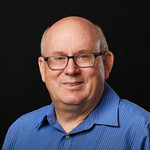 Stephen Wampler
Stephen Wampler
[email protected]
(925) 423-3107
Related Links
Nobel PrizeOPCW
Tags
Forensic Science CenterScience
Featured Articles
